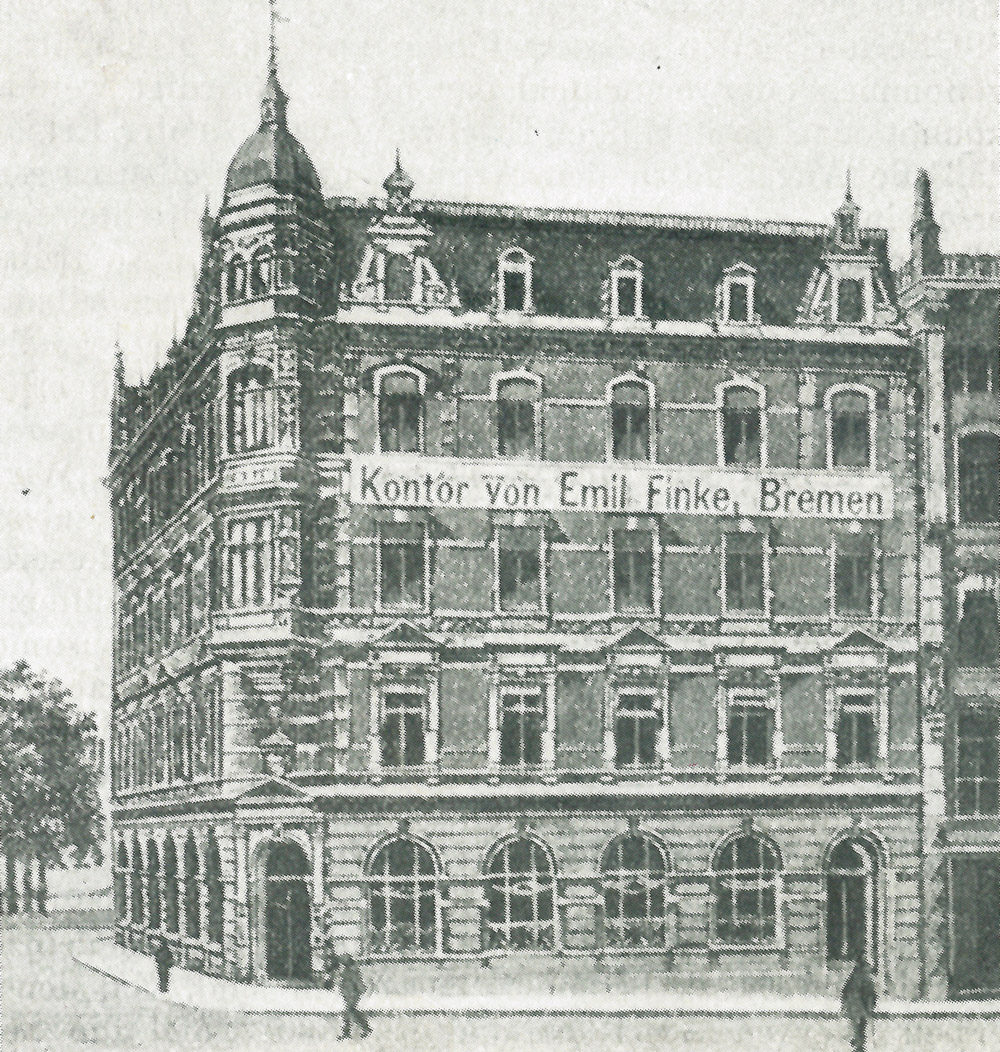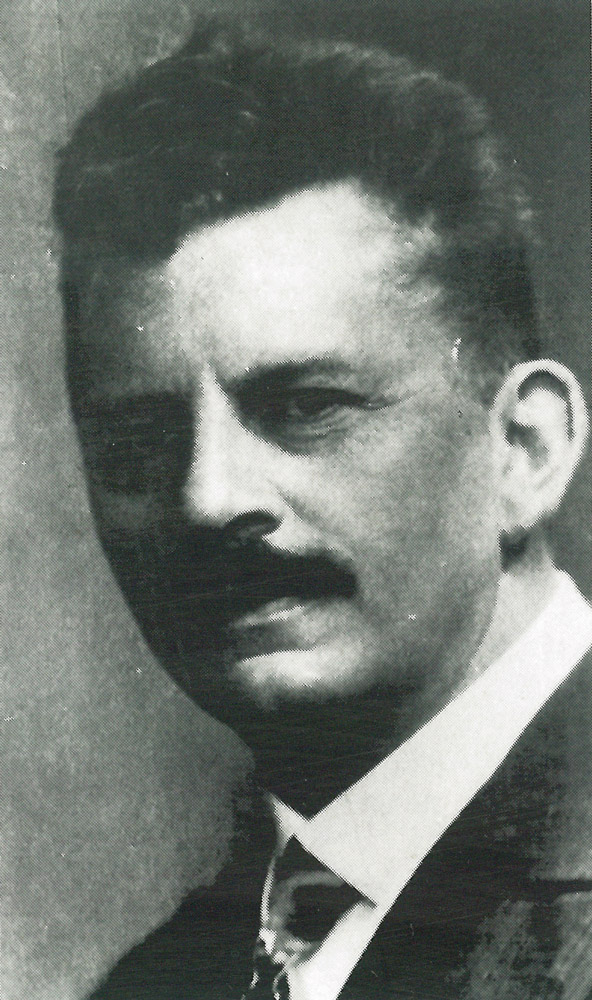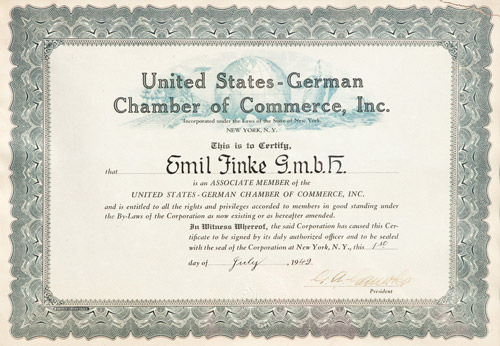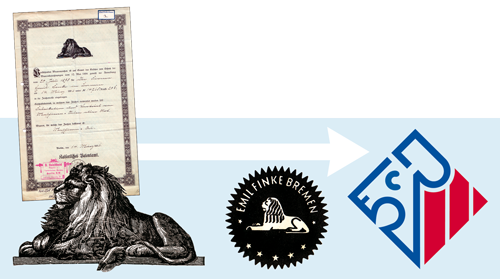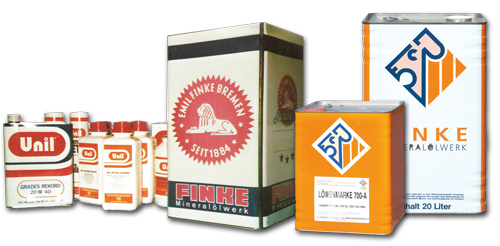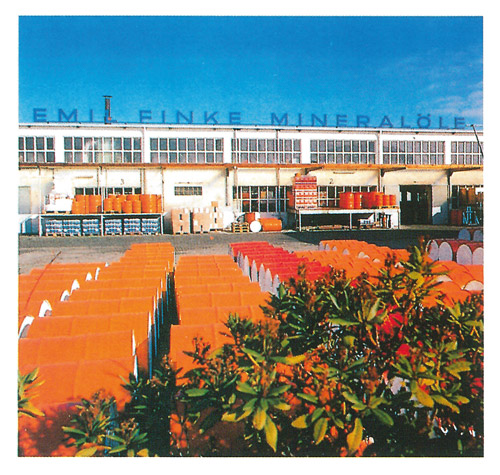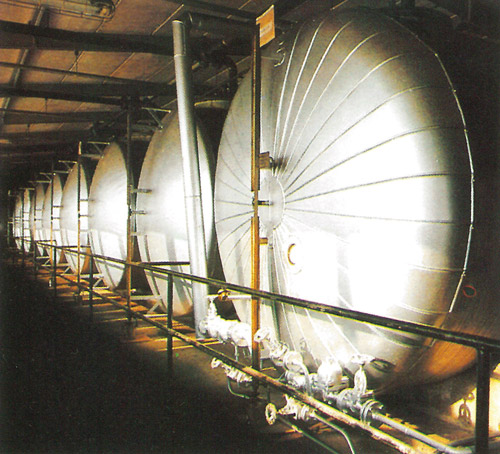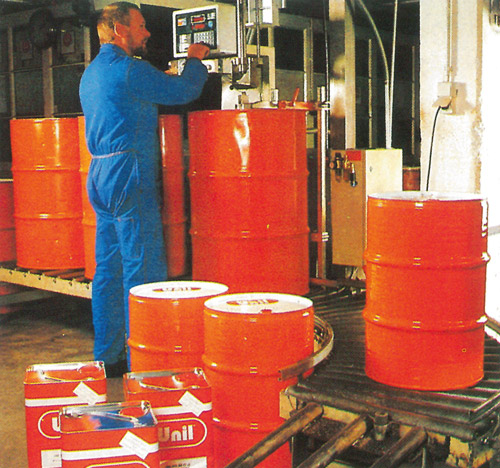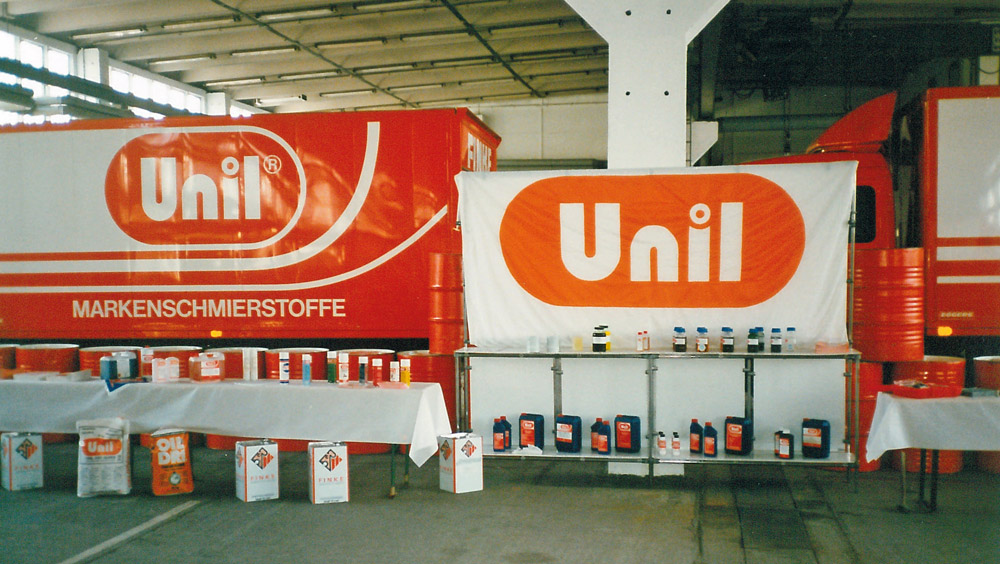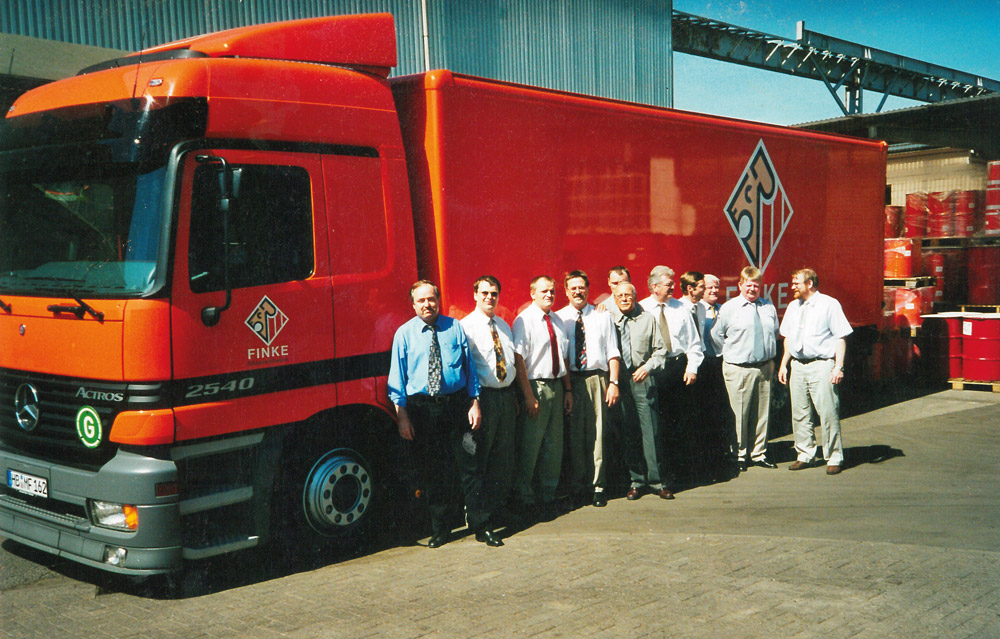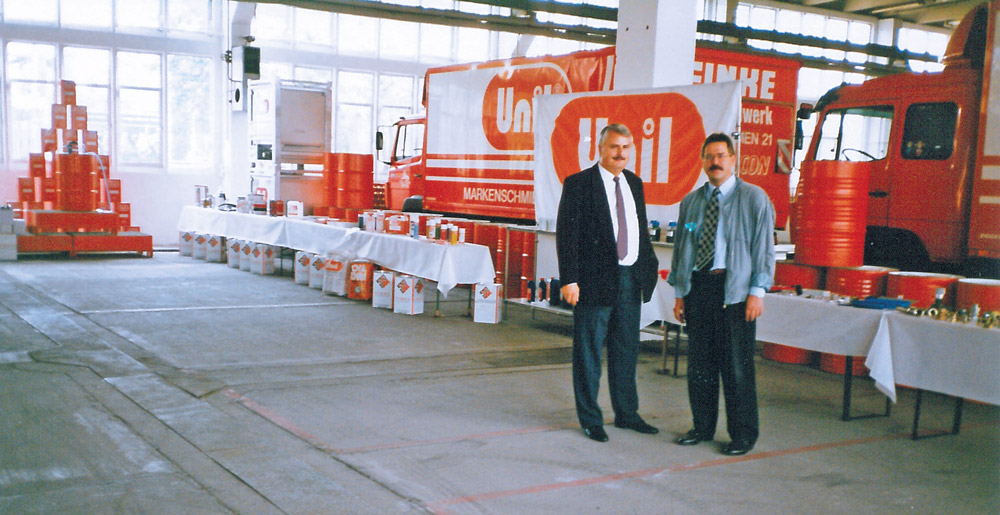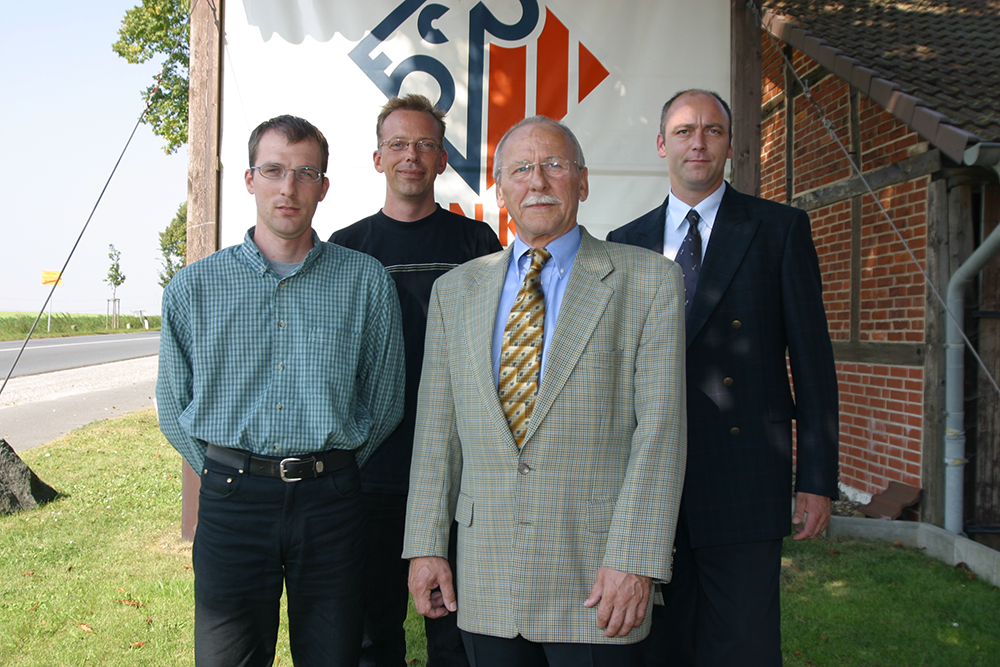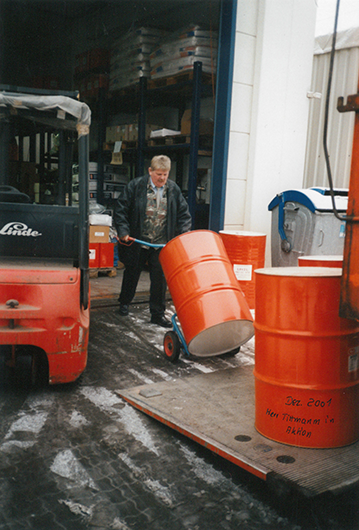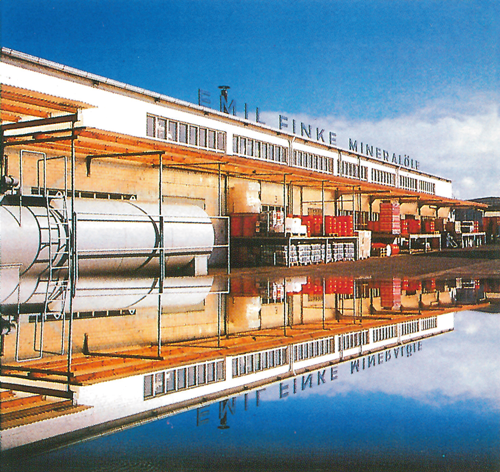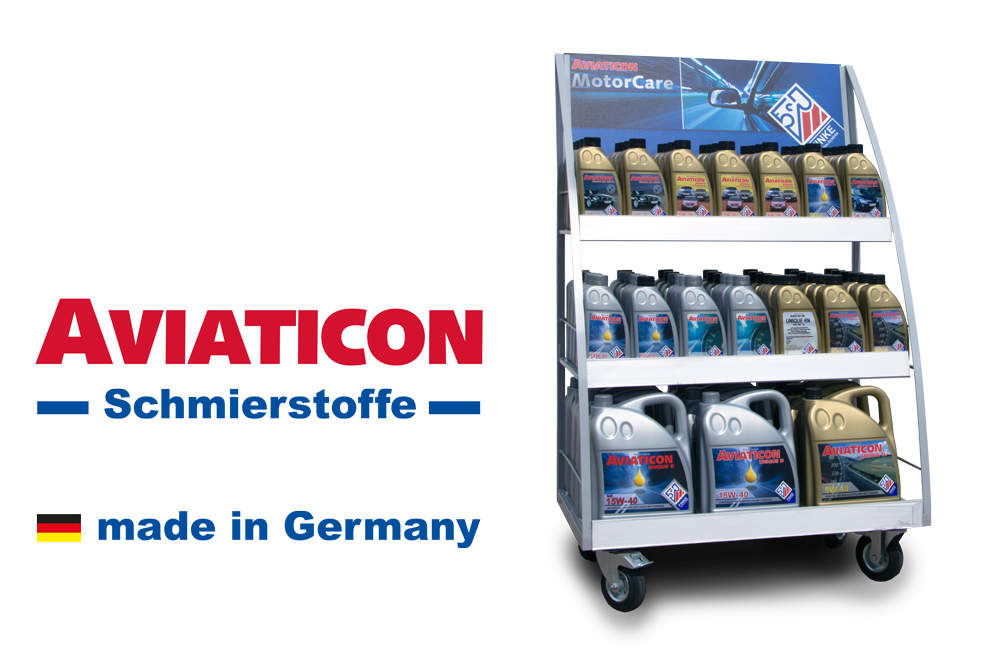Company history of Finke Mineralölwerk
Finke Mineralölwerk GmbH was founded in 1884 by then 26-year-old Emil Finke. The company was incorporated precisely at a time when the use of mineral and lubricant oils was gaining momentum. At that time, the founder had probably not yet foreseen the great future of mineral oils.
The rising development in mechanical engineering brought about by industrialisation made mineral oil one of the most important factors in the economy.
After laying the cornerstone for market leadership, Emil Finke, who died in 1911 after a short illness, left his son Friedrich Carl Finke and his son-in-law Alexander Rudeloff a flourishing midsize company. They further expanded the business until the outbreak of the First World War.
After the end of the war and the economic blockades, and thanks to American sources of supply, it was possible to get the first shiploads to Germany and rebuild the company.
Investments were made in modern waste collection and mixing plants. However, the family business suffered, along with many other enterprises, a further severe backlash due to the outbreak of the Second World War.
However, after weathering the storm, in 1955 the company acquired a plot in Bremen, Große Riehen 10, where a part of the lubricants manufactured in-house are still produced and bottled.
In the following years, the company continued to expand unceasingly. The first subsidiary was built in Wülfingen, and export partners were acquired in Turkey, the Czech Republic and Romania.
After the opening of the Inner-German border, one of the first companies was acquired there. Leipzig, Magdeburg and Neustadt-Glewe locations were also added.
In 2002, the company merged into a new company group and built the most modern production plant in northern Germany.
The Visselhövede manufacturing plant currently encompasses a total storage volume of 1,500,000 litres. It also has 7 mixing tanks in which up to 90,000 litres of lubricant can be produced per shift. The current warehouse area covers 3,000 sqm and can be used to store containers, barrels and small casks.
1884
On April 15, 1884, Emil Finke, then only 26 years old, founded Finke & Plump as an open trading company jointly with his friend and partner Friedrich Plump.
The company was incorporated precisely at a time when the practical use of mineral oil lubrication was gaining momentum. The founder probably did not even anticipate the great future of mineral oil which, with the rise of industrialisation, had become an essential factor enabling the mechanical engineering development of the last decades.
After five years the company partners split up, and in 1889 Emil Finke established a general trading and commission business in Bremen, Obernstraße. After only a few years, it became a model company. In 1900, the office was moved to Domshof square.
1911
After the death of the company founder in 1911, his son Friedrich Carl Finke and his son-in-law graduate engineer Alexander Rudeloff took over the company. Since Frederick Carl Finke died in the war, Alexander Rudeloff continued to manage the company alone after the First World War. Alexander Rudeloff expands the company mainly leveraging imports from Russia and America, thus ensuring that the first American lubricating oil shipload comes to Germany right after the end of the war.
In 1920 Prof. Karl Rudeloff joins the company as an associate and scientific specialist followed, in 1931, by Alexander Rudeloff’s eldest son Emil Karl Rudeloff. After being appointed as an authorised signatory in the mid-1930s, he already played a major role in the company management at that time. In this period, the office was located in Contrescape 171.
The outbreak of the Second World War led to structural changes in the company. Due to the ravages of war in Bremen, the company was relocated to Soltau. The loss of all imports forced the company to narrow the field and switch to German mineral oil refineries.
1946
When Alexander Rudeloff died in 1946, Emil Karl Rudeloff began to rebuild the sales organisation which had survived in the western part of Germany, as well as restoring and giving the company back its old significance.
AOC, Aviaticon Oel Company, was founded in 1949. This organisation dealt with wholesale and foreign trade, and in 1957 became a personally liable partner of Emil Finke GmbH & Co. KG. In 1955, with the purchase of a plot of approximately 7,000 m² in Große Riehen 10, the company new rise could finally take place after the Second World War. The first warehouse with garage and barrel washing system was created.
1957
In 1957 Karl Emil Rudeloff suddenly died and his wife Luise and his mother Emilie Rudeloff became owners of the company, and longtime authorised signatories Rolf Ebert and Helmut Rethorn were promoted to managing directors.
During a second expansion phase, a warehouse provided with overhead tanks for about 400,000 litres of lubricants and a filling system was built in 1962. As a result, the operation that had been outsourced to Soltau during the war was no longer necessary. In 1968, Emilie Rudeloff died, and economic editor Ralf Rudeloff took over in her place.
On April 1, 1974, the forward-looking discussions between the owners and Ulrich Kaste had gone sofar that the latter joined the company as an associate and sole managing director. He initially took over Ralf Rudeloff’s shares and in 1977 also Luise Rudeloff’s stake, thus initiating the third phase of the company's development.
An office building was erected on the company’s premises, and the necessary operational laboratory expanded.
Together with partner companies, Emil Finke joined UNIL Deutschland GmbH, an association of medium-sized mineral oil companies. In 1979, the lubricating grease industry joined the association.
In order to secure the business, holdings in the company Karl Kraus Mineralöle Norderstedt were acquired – which subsequently ended up in a complete takeover.
Jointly with Aviaticon Oel Company, an enterprise named Land- und Gartenbedarf KG was founded in Bremen.
Located in Hamburg, the Neubert company was specialised in release agents. Its takeover occurred in 1982.
In 1982, the expansion of the lubricant business required the erection of a warehouse for ready-to-ship containers.
With the commissioning of computer-controlled dosing systems, two automated container filling systems were installed.
On April 1, 1984 Emil Finke’s company celebrated its 100th anniversary.
The positive business development required a separation between production and sales.
In 1987, Finke Mineralölvertriebs-GmbH was incorporated and Ralf-Ulrich and Axel Kaste became shareholders of both Finke Mineralölvertriebs-GmbH and Emil Finke GmbH & Co. KG.
By expanding the mineral oil storage area and filling hall, additional 300,000-litre storage containers were created, while the supply of basic materials and products was ensured via the existing company-owned connecting track and road tankers.
1989
In October 1989, the political turnaround allowed for the opening of the separation wall in Germany. Through former family connections of the Kaste family along the edges of the former GDR, Ulrich Kaste succeeded in quickly establishing contacts again in the old sales areas of Dresden, Leipzig, Zwickau and Magdeburg.
On the premises of SKET, a company in Magdeburg, Ulrich Kaste rented a hall section. At that time, SKET employed 24,000 people, of which 13,000 worked in Magdeburg alone. Among them also graduate engineer Wolfgang Fleischer, who was responsible for lubrication technology at SKET during GDR times.
Wolfgang Fleischer initially played a dual operating role for both SKET and Finke.
The good contact with SKET management also enabled the first large lubricant deliveries from Finke Mineralölwerk. Large quantities of Aviaticon lubricants were delivered to Magdeburg by tank wagons.
A little later, during the search for employees, graduate engineer Dieter Pörschke was hired with the task of taking over the management of mixing plants and large industrial combines for Finke. The move to the Buckau machine factory in the Struve centre, Porsestraße, took subsequently place.
1990
In September 1990, the Magdeburg branch already had 6 employees. In November 1990, Mineralölvertrieb Nordhausen was founded, and Frank Schmidt became the company's authorised representative.
By establishing UNIL Handelsgesellschaft in Leipzig in 1991, Finke also paved the way for the establishment of a future branch office. Axel Kaste became the company’s authorised signatory and took over distribution to the new federal states.
The Magdeburg subsidiary was registered in the commercial register and Mineralölvertrieb Apolda GmbH could be established in Apolda jointly with other partners. The way for further expansion had thus been paved in Saxony.
As in Magdeburg, Ulrich Kaste was looking for a large business also in Leipzig, in the former GDR, which he actually found in VTA Paul Fröhlich. Here, Horst Richter was hired as a lubricant manager, responsible for lubrication. The company produced forklift trucks and lignite excavators.
1993
The team was growing steadily and already in 1993, Matthias Nettelrodt could be hired as an additional regional manager for Finke. On the farmyard of Fritz Rusche, oils were stored outdoors and there was also an Aviflex hose workshop.
One year later, the site was purchased and a modern lubricant warehouse was built.
In the Hanseatic City of Hamburg, the Karl Kraus company was integrated into the enterprise under Heiner Schulz’s branch management. From the headquarters he received the support of Thomas Hinze - today's Finke sales manager.
Bremen head office was the company’s headquarters; the laboratory was headed by Dr. Thomas Niemer, and the sales management by Wolf-Dieter Leibrandt, who has succeeded to then sales manager Edgar Reimers (1982-1996).
Emil Finke GmbH & Co. KG was responsible for purchasing and production (headed by Ralf Tonne and Jens Kreitzireck), and Finke Mineralölvertriebs-GmbH for distribution and the laboratory.
All engine oils were marketed under the UNIL brand name and all industrial lubricants under in-house Aviaticon brand. Many American companies headquartered in Germany were increasingly demanding food lubricants, and in the wake of this the products of American manufacturer JAX were included in the product portfolio.
1995
On October 1, 1995, Axel Kaste managed to hire an experienced coolant specialist from the industry. Günter Tittmann assumed the responsibility for lubrication since Axel Kaste was slowly preparing his retreat from Leipzig to take his father’s management position in Bremen.
A combined branch office for Aviaticon lubricants and Aviflex hydraulic hoses was built in Leipzig, Brahestraße; Eberhard Schöne became additional regional manager, and another sales office was set up in Dresden.
Hannover branch sinks its roots in Davenstedt, at Spedition Schäfer, already in the early 1960s.
At the beginning, Aviaticon lubricants were distributed via commercial agents. With the appointment of today's branch manager Frank Schmidt on April 1, 1974, Finke business could be significantly boosted in the Hannover region.
In the late 1990s, clouds slowly darkened over the corporate premises in Bremen. The company drove deeper and deeper into red due to wrong economic decisions and misinvestments in other business areas, until it finally went bankrupt on 14 November 2001.
2002
At New Year's Eve on 31.12.2001, Hoyer Group's sales halved by a new form of calculation which was to establish a precedent in Germany: Two German marks equal one euro.
Since September, trade and banks had been supplied with the new means of payment. Prices had to be made in two currencies so that people could get used to the value of the euro.
The upcoming imminent currency changeover had been advertised with posters and advertising campaigns, and so-called "starter kits" had started to be sold at bank counters on 17.12.2001. For 20 German Marks you could get something more than 10 Euro coins. You could not pay with them yet, though. This did not start until 00:00 on January 1, 2002.
After Heinz-Wilhelm Hoyer’s decision to take over Finke Mineralölwerk’s future, today's Finke Mineralölwerk GmbH was founded on February 1, 2002. From now on, the companies Wilhelm Hoyer KG, Hoyer GmbH Visselgas and Finke Mineralölwerk GmbH trod a common path.
Nearly all their employees could be guaranteed a secure job in the new company. All trademark rights and recipes, as well as the equipment for the production of lubricants and some real estate were acquired by Heinz-Wilhelm Hoyer.
The original idea of continuing to have the company run by the then managing directors (Kaste among them) was quickly rejected, since they did not prove to be loyal. As a result, the whole company management was practically restructured, and a new team was put together with reliable Finke employees and colleagues from in-house Hoyer line.
The objective was to bring the company back on track with the existing employee base. In the midst of planning, a serious decision was made by the shareholders of UNIL Deutschland GmbH - the new company was deprived of the right to sell UNIL products, a provision laid down in the shareholder agreement and legitimate in case of insolvency by one of the shareholders.
Nearly all products from the automotive industry were labelled UNIL at that time, and were approved by leading engine manufacturers. In this phase, a new entry joined Finke Mineralölwerk GmbH - Gerald Lutz who at the present time is still sales office manager in Celle and is responsible for lubricants and marketing in the Hoyer group.
The main tasks were firstly to build up a new product portfolio under the Aviaticon brand name; and then to apply for new approvals; to create a new marketing concept and to reorganise the purchasing and sales organisation.
Thomas Hinze became the new sales manager. His main task was to create a new sales management. The branches in Hamburg, Schwerin, Berlin, Beeskow, Hannover, Magdeburg, Leipzig, Nordhausen, Erfurt and Dresden were to exploit their synergies and merge with Hoyer branches to offer and market the Hoyer Group’s entire product range.
Many of then Finke branch directors, such as Frank Schmidt, Günter Tittmann or Dieter Pörschke were decisively involved in the creation of new joint Hoyer-Finke locations in their branch spaces.
Under the direction of Gerald Lutz, a completely new range of lubricants was developed and a new design conceived by the Emotion Media agency. All publications, brochures, data sheets, etc. get a new outfit. The export business was significantly expanded.







